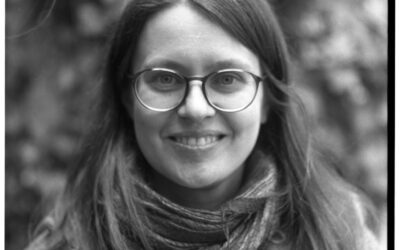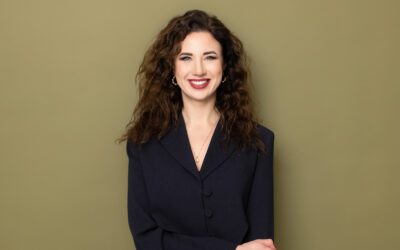AABS is pleased to recognize Daina Grosa for the completion of her dissertation “The psychosocial wellbeing of the children of return migrants: the case of Latvia,” for which she received the 2022–2023 Aina Birnitis Dissertation-Completion Fellowship in the Humanities for Latvia.
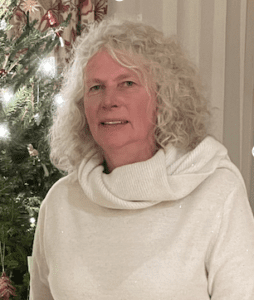
©Daina Grosa, 2023
Daina Grosa is a sociologist and researcher at Institute of Philosophy and Sociology at the University of Latvia. She defended her dissertation at the University of Sussex in the United Kingdom, with the title “The psychosocial wellbeing of the children of return migrants: the case of Latvia.” Her academic interests include applied linguistics and bilingualism, heritage language acquisition and maintenance, diaspora and migration policy, return migration of children. She was recently involved in a project “Exploring Well-Being and Social Integration in the Context of Liquid Migration: A Longitudinal Approach” (2018-2021).
The Impact of an Award: Report from Daina Grosa
After the completion of her dissertation, Daina Grosa submitted a reflection to AABS.
We thank her for her permission to publish her thoughts, which have been lightly edited.
The generous support of the Birnitis Fellowship in the final year of writing my dissertation has allowed me to concentrate fully on writing up my thesis over the course of this year, without having to seek other sources of income during this time. My future plans are to continue research in this area. This has already materialised with the Latvian Council of Science granting funding for the migration research team at the Institute of Philosophy and Sociology at the University of Latvia titled “Welcoming migrants in times of uncertainty: governance and local inclusion”. My contribution to this research project will concern the integration of Ukrainian refugees in schools in Latvia and how this contributes to the children’s wellbeing.
My PhD thesis is about return migration to Latvia and, specifically, the experiences of second-generation school-age children taken back to their parental homeland as part of family return. Children are often ‘invisible’ in studies of return migration; moreover, their return is seen as ‘psychologically safe’ since they are with their families, who are relocating to a ‘known’ environment. For the children, however, these assumptions need challenging, especially if they are born abroad, since their knowledge of their parents’ homeland may be extremely limited. Furthermore, their agency and voice in the return decision need to be unveiled.
Based on a multi-method investigation which combines a large online survey of emigrant and returnee parents with in-depth interviews with children, parents, teachers and key informants, the thesis addresses three main research questions which focus on the psychosocial wellbeing of returnee families and, especially, children:
- What factors influence the psychosocial wellbeing of children in the return-migrant family sphere?
- What are the experiences of return-migrant children in the Latvian school system?
- How are returnee children impacted by the broader social environment of their parental home country, including friendship and peer groups, the neighbourhood in which the family settles and the wider national system of values?
Conceptually, the thesis draws inspiration from Bronfenbrenner’s multi-level ecological systems theory, originally formulated to investigate the social development of children. My study is one of the few to apply the Bronfenbrenner schema to a migration setting and the first to use it in a study of return-migrating children.
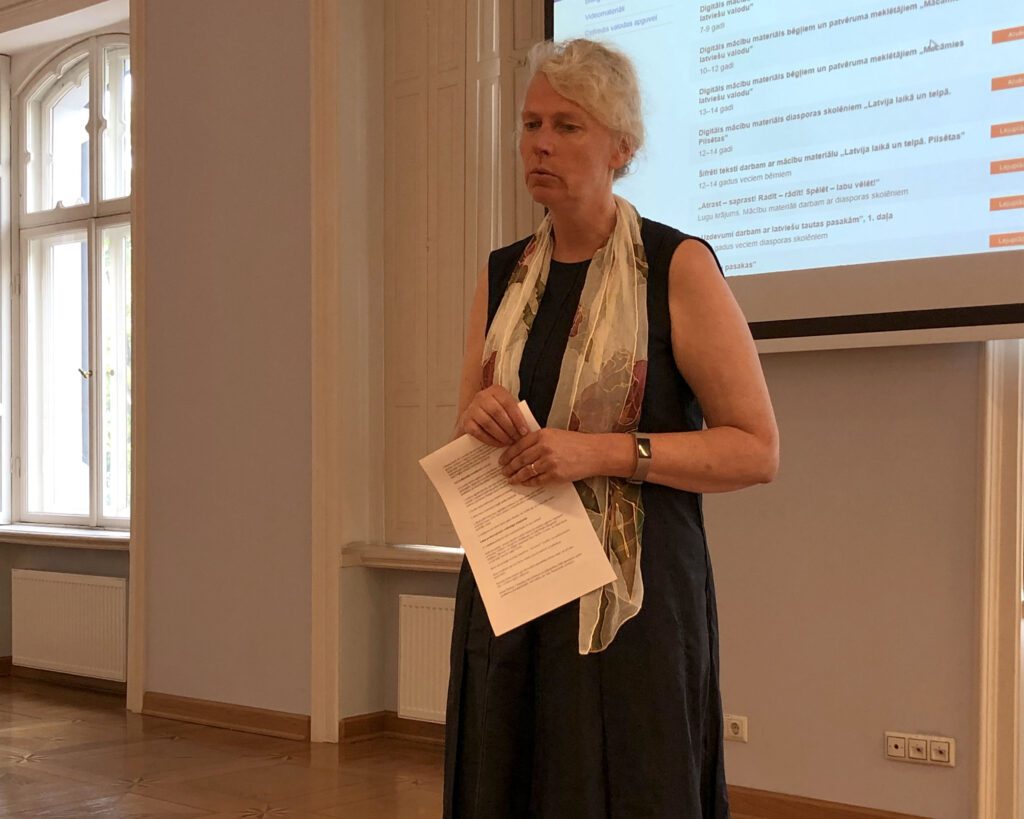
Daina Grosa presenting at the University of Latvia
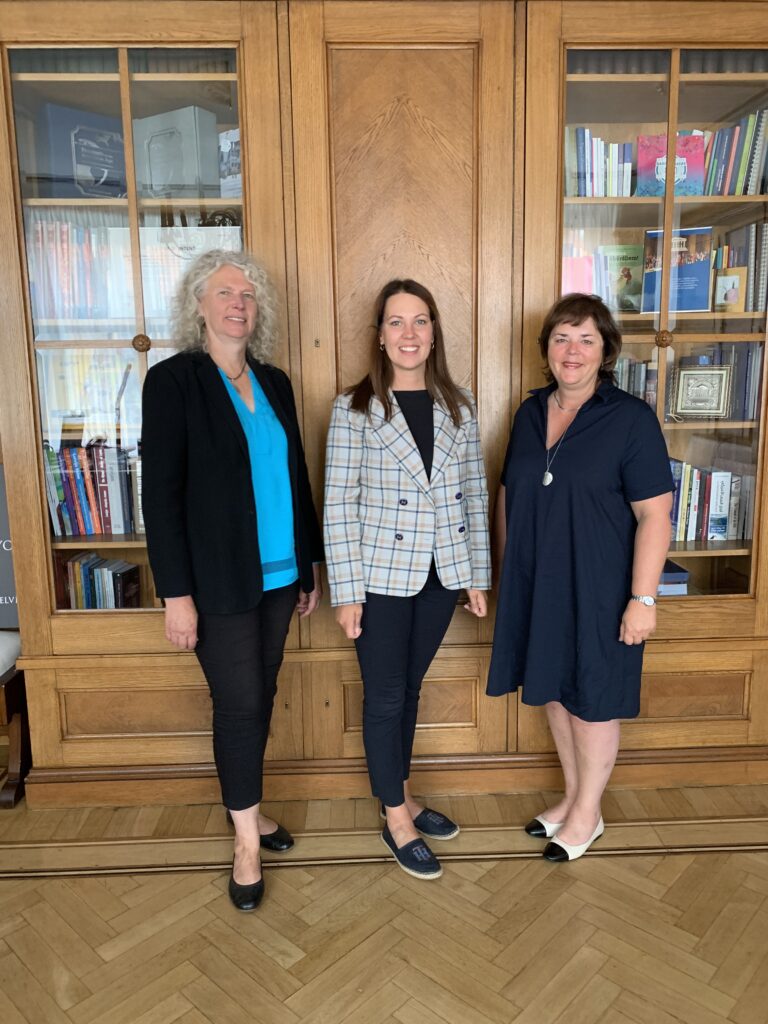
Daina Grosa (L) meeting with Anita Muižniece (C), then Minister of Education of Latvia, and Prof. Dita Nimante (R), University of Latvia
In the three main empirical results chapters, the first investigates the macrosystem, the larger political, economic, social and cultural context of returnee families’ and children’s lives, dominated by the survival of ‘Soviet’ values as well as attempts to develop reintegration policies for returning Latvian families and children. Next comes a chapter devoted to the exosystem, which includes lower-level or meso-scale settings that the children may not be directly in contact with, yet which can still influence their wellbeing and development – examples are neighbourhood relations, the roles of local return-migration coordinators and school administrators and the working schedules of parents, dependent in turn on their labour-market integration. The third and arguably most important empirical chapter focuses on the microsystem – the environment that the child directly engages with and with which (s)he regularly interacts and participates. Key here are the family, school and peer-group spheres. Within the school setting, the attitude of teachers is a key variable, along with the child’s knowledge of the Latvian language; both can either facilitate or hamper academic progress and integration into school.
Underlying Bronfenbrenner’s interacting multi-level systems is the chronosystem – a series of time-dependent phenomena ranging from important historical events such as Latvia’s accession to the EU which opened up a wide space of migration opportunities, the 2008 economic crisis and the 2020–2021 Covid-19 pandemic, to life-stage, biographical and demographic variables such as the gender and age of the child, the length of the period spent abroad, the age and timing of the return, the family structure and so on.
The research findings expose the variety of factors that can potentially influence the psychosocial wellbeing of children relocating to the parental homeland. From the outset of my research I did not envisage that one or two specific factors more than others would surface as defining influencers of the psychosocial wellbeing of children of returnees. To my mind, the findings would not end up being a list of factors – ordered in terms of frequency. Rather, the study highlighted many different factors that contribute to the wellbeing of a returnee child or adolescent, as people have a myriad of experiences and perceive these experiences individually. These would be complex and multi-layered and would also interplay with each other in a wide and individualised array of permutations. My findings did, indeed, show this and more: that what matters is – as in all life experiences – how the various elements and systems in any given situation individually and jointly influence the child and also how the child perceives this experience. It is also important to bear in mind protective mechanisms which exist in supporting the child and which can help to mitigate stressors. These can be evident either in the family setting (both the immediate, and also the extended family) as well as in the school environment (class and subject teachers, school psychologists, even school librarians and organisers of extra-curricular activities).
The thesis closes with recommendations for improving policies of assistance to returning families and children. These cover a number of spheres: among them are the strengthening of intercultural education programmes in schools; the need for special attention paid to returnee children to mitigate the risk of being bullied; suggestions for academic exemptions regarding assessment and accommodation in relation to Latvian language proficiency during the first few months following return, assigning of teaching assistants to all newcomers (if necessary); access to online professional development courses for teachers working with newcomers to the Latvian education system; the developing of handbooks by schools for returning parents explaining expectations of schools and school traditions and the establishing of regional support groups for returning families.
– Daina Grosa, 2023
Daina Grosa
What is the Birnitis Fellowship?
The Aina Birnitis Fellowship supports a year of research and writing to help advanced graduate students in the humanities in the last year of Ph.D. dissertation writing. The fellowship provides a $21,000 stipend for one year plus $1,000 for university fees.
The application deadline for academic year 2023-2024 was February 1, 2023. Applications were evaluated by the AABS 2023–2024 Grants Committee consisting of AABS VP for Professional Development Dr. Kaarel Piirimäe, AABS President Dr. Dovilė Budrytė, and AABS Director-at-Large Dr. Daunis Auers. Award notifications will be made in April 2023.
Other Grants and Fellowships News
Sophie Peng Awarded 2024-2025 Baumanis Grant
The Association for the Advancement of Baltic Studies is pleased to announce that Sophie Peng has been awarded the 2024-2025 Baumanis Grant for Creative Projects in Baltic Studies for her project “Lace Narratives: Hand-work (EE: Käsi-Töö)." The Baumanis Grant is an...
Jelena Šalaj Awarded 2024-2025 Baumanis Grant
The Association for the Advancement of Baltic Studies is pleased to announce that Jelena Šalaj has been awarded the 2024-2025 Baumanis Grant for Creative Projects in Baltic Studies for her book project "North of Photography." The Baumanis Grant is an award made to...
Ornela Ramašauskaitė Awarded 2024-2025 Baumanis Grant
The Association for the Advancement of Baltic Studies is pleased to announce that Ornela Ramašauskaitė has been awarded the 2024-2025 Baumanis Grant for Creative Projects in Baltic Studies for her project "Art Across Borders: The Baltic Visual Legacy Project." The...



